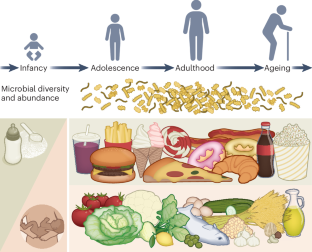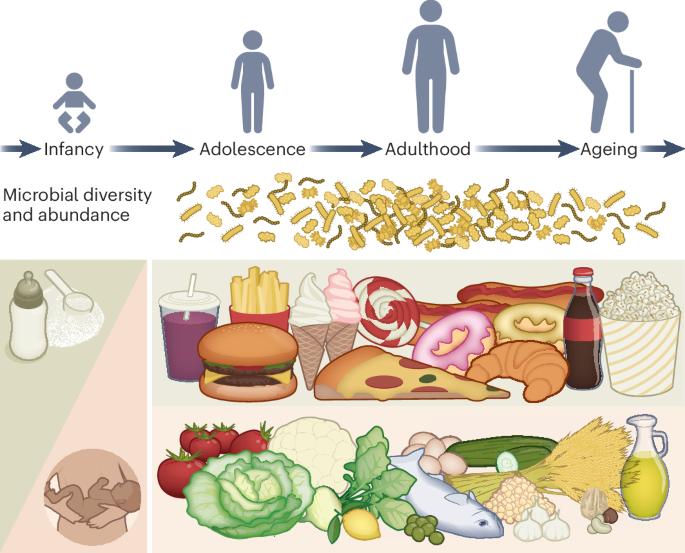Feeding gut microbes to nourish the brain: unravelling the diet–microbiota–gut–brain axis
IF 18.9
1区 医学
Q1 ENDOCRINOLOGY & METABOLISM
引用次数: 0
Abstract
The prevalence of brain disorders, including stress-related neuropsychiatric disorders and conditions with cognitive dysfunction, is rising. Poor dietary habits contribute substantially to this accelerating trend. Conversely, healthy dietary intake supports mood and cognitive performance. Recently, the communication between the microorganisms within the gastrointestinal tract and the brain along the gut–brain axis has gained prominence as a potential tractable target to modulate brain health. The composition and function of the gut microbiota is robustly influenced by dietary factors to alter gut–brain signalling. To reflect this interconnection between diet, gut microbiota and brain functioning, we propose that a diet–microbiota–gut–brain axis exists that underpins health and well-being. In this Review, we provide a comprehensive overview of the interplay between diet and gut microbiota composition and function and the implications for cognition and emotional functioning. Important diet-induced effects on the gut microbiota for the development, prevention and maintenance of neuropsychiatric disorders are described. The diet–microbiota–gut–brain axis represents an uncharted frontier for brain health diagnostics and therapeutics across the lifespan. This Review provides an overview of the interplay between host diet and the gut microbiota, and how this affects brain function.


喂养肠道微生物以滋养大脑:揭开饮食-微生物群-肠道-大脑轴的神秘面纱
脑部疾病(包括与压力有关的神经精神疾病和认知功能障碍)的发病率正在上升。不良的饮食习惯在很大程度上导致了这一趋势的加快。相反,健康的饮食摄入则有助于情绪和认知能力的提高。最近,胃肠道内的微生物与大脑之间沿着肠脑轴进行的交流日益突出,成为调节大脑健康的潜在目标。肠道微生物群的组成和功能受到饮食因素的强烈影响,从而改变了肠道-大脑之间的信号传递。为了反映饮食、肠道微生物群和大脑功能之间的这种相互联系,我们提出了一种饮食-微生物群-肠道-大脑轴,它是健康和幸福的基础。在本综述中,我们将全面概述饮食与肠道微生物群的组成和功能之间的相互作用,以及对认知和情绪功能的影响。文中阐述了饮食对肠道微生物群的重要影响,以及对神经精神疾病的发生、预防和维持的影响。饮食-微生物群-肠道-大脑轴代表着整个生命周期中大脑健康诊断和治疗的未知前沿。
本文章由计算机程序翻译,如有差异,请以英文原文为准。
求助全文
约1分钟内获得全文
求助全文
来源期刊

Nature metabolism
ENDOCRINOLOGY & METABOLISM-
CiteScore
27.50
自引率
2.40%
发文量
170
期刊介绍:
Nature Metabolism is a peer-reviewed scientific journal that covers a broad range of topics in metabolism research. It aims to advance the understanding of metabolic and homeostatic processes at a cellular and physiological level. The journal publishes research from various fields, including fundamental cell biology, basic biomedical and translational research, and integrative physiology. It focuses on how cellular metabolism affects cellular function, the physiology and homeostasis of organs and tissues, and the regulation of organismal energy homeostasis. It also investigates the molecular pathophysiology of metabolic diseases such as diabetes and obesity, as well as their treatment. Nature Metabolism follows the standards of other Nature-branded journals, with a dedicated team of professional editors, rigorous peer-review process, high standards of copy-editing and production, swift publication, and editorial independence. The journal has a high impact factor, has a certain influence in the international area, and is deeply concerned and cited by the majority of scholars.
 求助内容:
求助内容: 应助结果提醒方式:
应助结果提醒方式:


